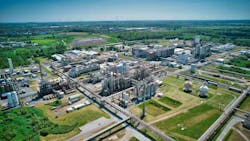Ineos to Shutter Two German Chemical Units, Cites High Energy Costs
London-based Ineos announced Oct. 6 plans to close two production units in Rheinberg, Germany, resulting in the loss of 175 jobs. The closures are driven by high energy and carbon costs combined with limited tariff protections, according to the company.
The company’s European operations are facing a severe cost disadvantage compared with producers in the United States and China, Ineos Inovyn CEO Stephen Dossett said in a press statement.
“Europe is committing industrial suicide,” Dossett said. “While competitors in the U.S. and China benefit from cheap energy, European producers are being priced out by our own policies and absence of tariff protection. Meanwhile, high-emission imports flood our market unchecked. It’s completely unsustainable and if not immediately addressed will lead to further closures, job losses and increased dependency on other regions for essential materials."
The Rheinberg closures affect the allylics unit, which makes ingredients for epoxy resins used in aerospace, automotive and renewable energy applications and an electrochemical facility that produces chlorine used in water treatment, pharmaceuticals and sanitation. The company will focus on maintaining its remaining PVC operations in Rheinberg, which support roughly 300 skilled jobs, and is seeking government assistance to manage transition costs.
The company’s latest move follows a pattern of site reductions across Europe. In June, Ineos Phenol said it would permanently close its Gladbeck, Germany, facility, which produces 650,000 tons annually of phenol and acetone for automotive and industrial applications. The company said high energy costs and CO₂ taxation policies left it unable to compete with Chinese imports. “Gladbeck is not the first and will definitely not be the last unless regulators wake up and take action,” Ineos chairman Jim Ratcliffe said in a June 17 statement.
Earlier in January, Ineos announced the closure of its ethanol plant in Grangemouth, Scotland — the U.K.’s last synthetic ethanol facility — also citing high energy prices and carbon taxes. Ratcliffe said the decision underscored the need for government reforms to improve industrial competitiveness. “De-industrializing Britain achieves nothing for the environment,” he said. “It merely shifts production and emissions elsewhere.”
Ineos has previously closed or mothballed assets in the U.K., Belgium, France and Spain as part of a broader restructuring tied to rising costs and declining output. German chemical production has dropped 18% since 2019, according to the company, leading to job losses and reduced investment.
Dossett said the company will work closely with employees and partners to minimize the impact of the latest closures.
About the Author
Amanda Joshi
Managing Editor
Amanda Joshi has more than 18 years of experience in business-to-business publishing for both print and digital content. Before joining Chemical Processing, she worked with Manufacturing.net and Electrical Contracting Products. She’s a versatile, award-winning editor with experience in writing and editing technical content, executing marketing strategy, developing new products, attending industry events and developing customer relationships.
Amanda graduated from Northern Illinois University in 2001 with a B.A. in English and has been an English teacher. She lives in the Chicago suburbs with her husband and daughter, and their mini Aussiedoodle, Riley. In her rare spare time, she enjoys reading, tackling DIY projects, and horseback riding.

